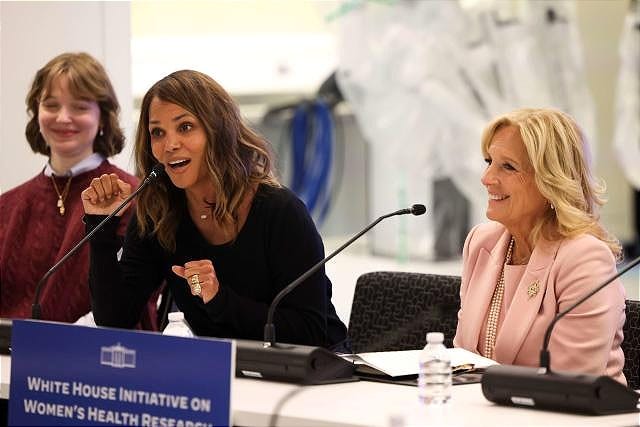The Day I Talked to Halle Berry About Her Vagina
And what it taught me about power, midlife, and menopause.

At a speakers’ lounge in the Venetian Hotel, over a glass of pinot noir, Halle Berry told me a story about her vagina.
It went like this: Halle had been enjoying incredible intimacy with her new boyfriend when, after an amazing night, she went to the bathroom and felt that dreaded burn. What followed was panic, confusion, and of course worry about what it could mean for a new relationship. Her doctor initially diagnosed herpes. Halle, in disbelief and frustration, confronted her boyfriend, only to learn later that the real culprit wasn’t an STI at all: it was menopause.
Now, I have to admit, as Halle told me this story, I was struck— not because of the details but because of what it portends. If Halle Berry, a woman with access to the best healthcare resources possible, was made to face this kind of confusion and discomfort, what does that mean for the rest of us mortals?
In the days that followed, I learned that the Oscar-winning actress shared the same tale elsewhere— at Fortune’s Most Powerful Women Summit a few days before I met her and on Good Morning America months before that. In fact, she’d told this same story to a long list of media outlets. I realized it wasn’t just a one-off unbosoming to me, but a carefully curated publicity machine in action.
“I’m in menopause!” she boldly stated during an interview with Fortune’s Michal Lev-Ram. “How liberating is that?”
I found myself thinking, Have we hit the era of menopausal TMI? But before I went down that rabbit hole, I paused. Maybe we haven’t. Maybe we’re all too starved for this kind of openness to have had enough.
It isn’t just Halle; several women who’ve spent decades in the public eye are discussing the realities of menopause. Naomi Watts has launched a line of creams–including a gel moisturizer dubbed Vag of Honor–and other products for menopausal women called Stripes Beauty. (“Welcome to a World Where Menopause Isn’t a Dirty Word,” says the Stripes site, hawking a $90 “limited-time only” Menopause Survival Kit). Drew Barrymore has started promoting menopause supplements on her Instagram. And as of this month, Berry has a menopause-focused platform called respin, which she was eager to tell me about. In Hollywood, meno is the VC version of Joan Crawford, but for a savvier generation of actresses who aren’t waiting to play Mildred Pierce. For years, we watched women stars “age gracefully”-- and judged them critically. But now? Now they’re letting loose–not in spite of their menopausal experiences, but because of them. It makes me wonder if something much deeper is going on here.
Growing up, I remember my mother navigating “the change.” Like most women, she was put on hormone-replacement therapy, only to be pulled off in 2002 when the infamous Women’s Health Initiative study came out, claiming HRT increased the risk of heart attack and stroke. Within months, the number of women who were taking HRT dropped by nearly one half. The study was since revealed as flawed—and so for two decades, women have quietly suffered the consequences of medical inertia. Fewer than one in five obstetrics and gynecology residents receive formal training in menopause medicine. And less than one-third of OB/GYN residency programs in the United States have a dedicated menopause curriculum.
“Nobody knows anything,” an editor friend at the New York Times told me as we discussed treatment and healthcare for this weird life stage. Sixty percent of American women say they’re entirely self taught when it comes to menopausal knowledge, says Midi Health CEO Joanna Strober. The medical establishment gave a shit about us in our “fertile years” but then turned a blind eye once we were “done.”
So now, as we see prominent and powerful women talk about their menopausal experiences, I think: So if there’s money in this? God bless. There should be. Because for too long, women in midlife have been sidelined, overlooked, and outright ignored. Our bodies, our experiences, and our needs don’t suddenly become irrelevant when we’re no longer able to have children.
Women over the age of 50 account for more than one-fourth of consumer spending. We are the wealthiest and most active generation in history, referred to by Forbes as ‘super consumers.’
So I’m here for it. Halle, if you want to keep telling your story, go right ahead. If you want to sell supplements, creams, lubes or menopause awareness t-shirts, I’ll cheer you on. Because maybe, finally, we’re going to recognize the value of the women who’ve been here all along, giving and giving, while quietly bearing this part of life in silence.
Let's go.







Now that I'm old enough to understand 40 isn't a death sentence, I weep for the women before us who had no internet to turn to. They had to do this shit in the shadows with no fancy creams, gels, shirts, or sisters in arms.
Whether it's bleeding, drying, or hanging off, you can talk to me about vaginas all damn day - yours, Halle's, that lady in the checkout line's. I'm here for it, lady! 💪🍑
Honestly, as a health coach I learn new things about my own body and hormonal fluctuations almost every day! Why the fuck we are not being taught these things is beyond my comprehension.